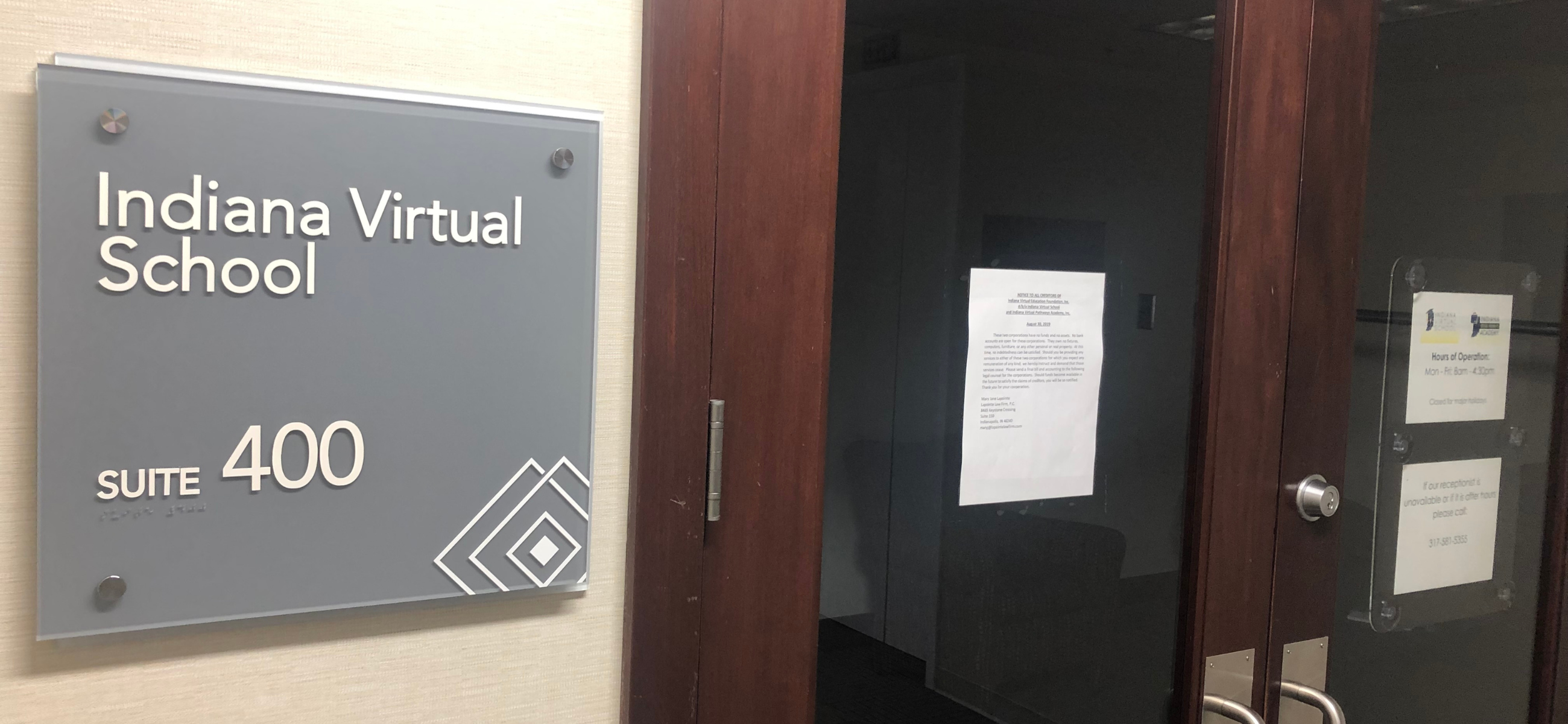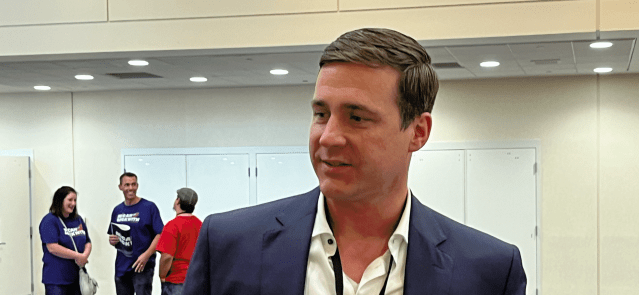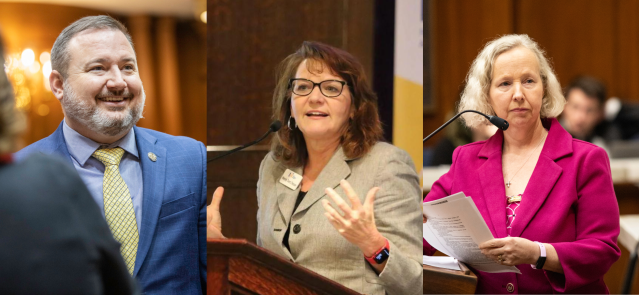Stay ahead of the curve as a political insider with deep policy analysis, daily briefings and policy-shaping tools.
Request a Demo
The office door of Indiana Virtual School in Indianapolis after it was ordered closed by state officials in 2019. (Credit: Tom Davies)
- Defense attorney says online schools leader Thomas Stoughton has bounced checks, not responded
- Stoughton faces contempt of court hearing over sale of Florida condo for $2.6 million
- Stoughton’s actions raise doubts over whether state can recover money from alleged fraud
The Indiana online school operator accused of leading a $150 million enrollment fraud scheme faces having no legal representation in the criminal and civil cases against him, leading to questions about whether the state can recover any of that money.
Federal and state officials allege the schools led by Thomas Stoughton — Indiana Virtual School and Indiana Virtual Pathways Academy — reported thousands of students as enrolled despite those students having never completed enrollment or not logging in to online classes for months.
The state attorney general’s office accused Stoughton this week of violating court orders by recently selling a Florida condominium for nearly $2.6 million after a mortgage holder filed a foreclosure notice against the property.
The Hamilton County judge overseeing the state’s lawsuit against Stoughton and others has ordered Stoughton and his wife to appear in court Monday as he considers whether to find them in contempt of court.
Defense attorney says he’s not been paid
If Stoughton has money available, he has not used it to pay for his criminal defense team.
Prominent Indianapolis defense attorney James Voyles filed this month to withdraw as Stoughton’s lawyer in the federal criminal case against him.
Voyles said in the court filing that Stoughton went months without paying “agreed upon financial obligations” and then delivered two checks to Voyles’ law office in July that were returned for insufficient funds.
“Counsel (and counsel’s staff) have been reaching out to Mr. Stoughton via telephone and email with no response since August 19, 2024,” Voyles wrote. “All phones associated with Mr. Stoughton go directly to voicemail and there has been no acknowledgement of the receipt of any email communication. There has been a significant breakdown in communication.”
Voyles confirmed to State Affairs that he has had “no further communication” with Stoughton and still intends to withdraw from the case. Voyles, whose clients have included boxer Mike Tyson and Indianapolis Colts owner Jim Irsay, declined further comment.
State Affairs tried calling the phone number listed for Stoughton in court documents, but the line was disconnected. No response has come from emails sent to an address for Stoughton included in court records.
Stoughton without civil case attorneys since June
The schools led by Stoughton were shut down in 2019 and the state attorney general’s office filed a lawsuit in 2021 against Stoughton and others allegedly involved, claiming the scheme defrauded the state of more than $150 million.
Stoughton and several companies linked to him have not had attorneys representing them since June in the lawsuit, which is pending in a Hamilton County court.
That is when attorneys with the Carmel law firm Kopka Pinkus Dolin terminated their representation, citing in a court filing “an irretrievable breakdown of the attorney-client relationship.”
Federal prosecutors in January obtained an indictment against Stoughton and two other school officials charging them with 76 counts of wire fraud and money laundering.
Prosecutors maintain that state money from those padded enrollment counts was funneled through shell companies and eventually into bank accounts, many of which were controlled by Stoughton or his family members.
Stoughton has remained free while awaiting trial, for which U.S. District Court Judge Richard Young has set aside the entire month of April 2025. Stoughton faces potential prison sentences of 10 to 20 years on each count.
The U.S. Attorney’s Office in Indianapolis declined to comment on the status of the case.
Uncertainty about state recovering money
Stoughton’s failure to pay for his criminal defense makes the odds of the state recovering much money from him “very long in a bad way,” said Democratic state Rep. Ed DeLaney, a retired trial attorney and partner at the law firm Barnes & Thornburg.
Since the fraud allegations became public in 2019, DeLaney has criticized “very thin laws” adopted by the Republican-dominated Legislature for leading to insufficient oversight of online charter schools such as those operated by Stoughton.
“There’s enough money that was disappeared or moved around in this case that it’s possible that the money is somewhere, but the more likely odds are that there isn’t any money because you’re going to pay for the defense,” DeLaney told State Affairs. “That’s the best investment you can make under those circumstances, if you have money, is in your defense, because you’re literally buying your freedom. Even if you have to end up pleading guilty, you’d rather plead guilty to a shorter sentence than a longer one.”
Attorney General Todd Rokita’s office filed the lawsuit against Stoughton and about two dozen other individuals and companies allegedly involved in the fraud.
The lawsuit cited a state Board of Accounts review that found the two online schools improperly claimed about 14,000 students as enrolled between 2011 and 2019 despite no online course activity.
The lawsuit seeks repayment of about $69 million it claims the schools wrongly received in state student enrollment payments. The suit also claims $86 million was improperly paid to more than a dozen companies linked to the schools by common business officers or relatives and done so with little or no documentation.
Rokita’s office said in a statement to State Affairs that it hopes to “recover any sums that were wrongly misappropriated for personal gain instead of used for educating our young Hoosiers.”
“We do not know whether the defendants, and there are many of them, will be able to pay the damages and restitution,” the statement said. “What we do know, however, is that we remain committed to fighting to recoup the misappropriated money and are continuing to pursue our case.”
Contempt of court hearing over Florida condo sale
Monday’s Hamilton County court hearing will be on the request from the attorney general’s office that Stoughton’s sale of the condominium on Longboat Key near Sarasota, Florida, be found in violation of court orders prohibiting him from selling property while the case is pending.
The office also argued that Stoughton violated the order limiting him to paying “routine bills and expenses as they arise, provided that the total expenses do not exceed approximately $20,000.00 per month.”
Attorneys for other defendants in the lawsuit declined to comment or did not respond to email messages from State Affairs.
Cynthia Baker, a professor at Indiana University’s McKinney School of Law, said Stoughton’s actions suggest he doesn’t have available financial assets.
Baker said the quick pace at which the state opened such privately operated schools to receiving state school tuition payments left the system vulnerable to fraud.
The lengthy time it has taken for the cases to move through the courts also hurts the chances of getting back much of the lost money, she said.
“It is an awkward process, expensive and not very likely to result in making the state whole again,” Baker said. “It’s a time-delayed long shot.”
Tom Davies is a Statehouse reporter for State Affairs Pro Indiana. Reach him at [email protected] or on X at @TomDaviesIND.
Know the most important news affecting Indiana
Get our free weekly newsletter that covers government, policy and politics that impact your everyday life—in 5 minutes or less.
The man behind the governor: Josh Kelley’s journey to Indiana leadership
As Gov.-elect Mike Braun’s transition team and priorities take shape, his right-hand man prepares to lead the staff tasked with ensuring the incoming governor’s vision becomes reality. Josh Kelley has quickly established a political career marked by several key achievements, including anchoring two statewide campaign victories, serving as Braun’s chief of staff in the U.S. …
COLUMN: Trump should seek Ukraine NATO membership on day 1
INDIANAPOLIS — The North Atlantic Treaty Organization is a military alliance founded in 1949 following World War II to keep Soviet influence in check. The United States is one of 12 founding members. There are 32 members, including Canada, the United Kingdom, Germany, Poland, France, Spain and Italy. Article 5 of NATO’s charter states that …
Howey Politics Indiana celebrates 30th anniversary
Storied Indiana political columnist Brian Howey was honored Tuesday at a gala celebrating his 30th year at the helm of his namesake newsletter, Howey Politics Indiana. Howey was joined at the event by his wife Susan, his fellow State Affairs teammates and political insiders. Know the most important news affecting Indiana Get our free weekly …
Incumbents win in 2 tight Indiana House races; Cash-Stoner outcome uncertain
The election outcome remained uncertain in one Indiana House district where Republican incumbent Becky Cash was leading Democrat Tiffany Stoner by less than one-tenth of a percentage point. Two other House incumbents — Republican Rep. Dave Hall and Democratic Rep. Wendy Dant Chesser — prevailed with narrow victories that aren’t expected to face recount challenges. …




